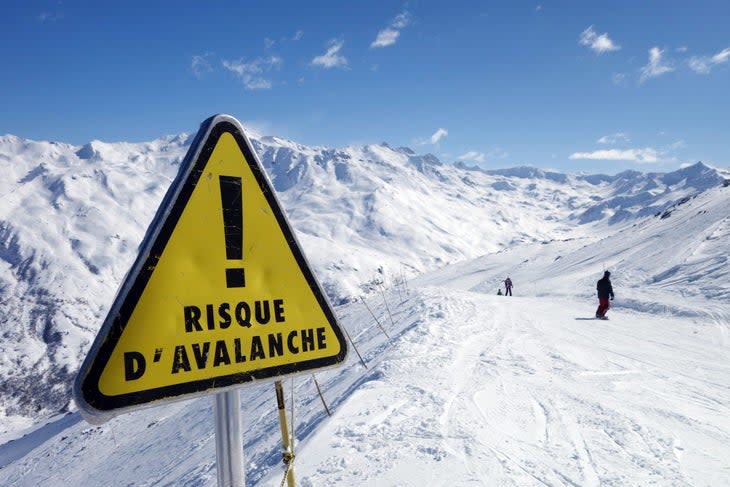How to Recover When Skiing Causes Emotional Trauma
This article originally appeared on Outside
Editor's Note: This story is part of our collection of articles covering Mental Health Awareness. It contains sensitive content related to dealing with death and trauma in the mountains. If you or anyone you know is struggling with mental health issues, help is out there. Start with the National Institute of Mental Health and its many resources.
She says she still dreams about shoveling her friend's body out of avalanche debris. The worst day of her life keeps coming back at night.
And she's not alone. If you get deep into skiing, especially if you get deep into the backcountry, you might have to acknowledge that the thing you love can kill the people you love. Skiing and trauma are tied together.
But mountain culture prizes shaking off tragedy. We pretend to be tough and unfazed. To cope we turn deaths into hero stories or we go silent. But if you're actively ignoring the brutal parts, in any part of your life, the trauma will catch you.
The National Institute of Health defines a traumatic event as a shocking, scary, or dangerous experience that affects someone emotionally. Trauma can look like a lot of different things in the mountains. It's not just avalanche panic, it could be watching a ski partner get seriously injured, helping with a body recovery, or getting your confidence shaken by a sketchy fall.
And those events impact everyone differently. Some people won't be fazed by a rescue or a death, but others will suffer long-term PTSD from a scary day in the backcountry. It can be almost impossible to say when that will happen, or to who, but that suffering can root deep.

PTSD can manifest in many ways, from exhaustion to hypervigilance. At its worst it can lead to self-harm, or suicide. When it's less extreme it can look like lashing out at partners, withdrawing or not enjoying the things you used to love. It can be hard to tell where one behavior begins and another ends, or where something like stoniness goes from being helpful to being toxic. It's also tricky because some of the mechanisms we, as skiers, use to cope, like social drinking or exercising, can also be destructive when they're taken to the extreme.
Trauma, and the long-term stress it causes, is hard to deal with in any circumstance, and the tough-guy culture that's endemic to so many mountain towns makes it harder to take the first step toward treatment and care: talking about it.
"It's very, very difficult to stand up and say, 'I'm struggling here when I'm supposed to be tough,'" says Dave Richards, Alta's avalanche director, who has dealt with PTSD and is an advocate for mental health care in the mountains. "A 'buck up, Chuck' attitude is pervasive in mountain communities and mountain cultures."
That unfazed, unbreakable posture is toxic, but it's germane to life in the mountains, where a certain amount of mental tenacity is crucial. You do need to be stoic in the face of chaos if you're a ski patroller, and you might need to make hard split-second decisions in backcountry terrain. It's tricky to bring in the idea that you don't have to be tough all the time in a culture that--often for good reason--prizes toughness. Or to address the dichotomy that people who are strong, capable, and can suffer through big days in the mountains can also hurt, have long-standing damage, or be vulnerable.
Plus, according to Bobby L'Heureux from Big Heart Big Hands, a Vail-based nonprofit that helps provide mental health counseling to those affected by mountain rescue, skiers tend to be highly individualistic. "There's a lot of shame around asking for help," he says.
But asking for help is the first, biggest piece of the puzzle. According to the NIH, the best way to address trauma in real time is to talk about it with people you trust. The number one predictor of how someone will recover after a traumatic event is how safe they feel in their relationships. It's crucial to have a community that you're close to, which can be really difficult to find in a transient ski town full of hard men (and women).
Reverend Dr. Scott K. Beebe, pastor of the Mount of the Holy Cross Lutheran Church and a member of Colorado's Vail Mountain Rescue Group, says the hardest part of treating trauma is starting a conversation about loss and grief. Don't feel bad or weird about getting help, it means you're taking care of yourself. Talking through guilt, shame and grief, especially in a cognitive behavioral therapy setting, can help. Knowing why you feel bad peels back the pressure of feeling bad itself. Talking about it takes away some of the shame.
Vulnerability is a tricky road, especially for mental health issues. One of the things that Richards is thinking about a lot these days is how naming the problem can be a big step in getting help and working through it. We need to be talking about it.
For my friend who survived the avalanche, many hours of therapy dealing with survivor's guilt, the trauma of the experience, and the crushing grief of losing a friend and ski partner have helped to lift the weight. Without it, she says, she might not have been able to return to the mountains she loves at all.
Acknowledge that it's real and that it's hard, and that it can happen to us in the mountains, and then de-stigmatize getting help. We don't want to let crushing incidents cripple us more.
For exclusive access to all of our fitness, gear, adventure, and travel stories, plus discounts on trips, events, and gear, sign up for Outside+ today.

